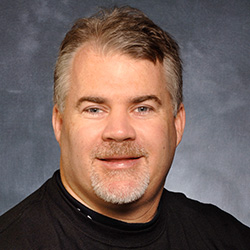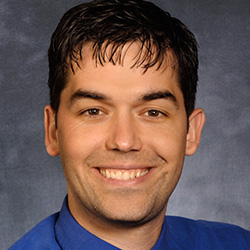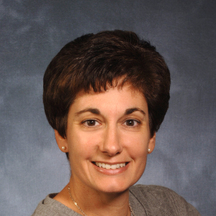Residency: Neurology
The neurology residency program at North Carolina State University is a three-year program designed to provide advanced training in both medical and surgical neurology. Training is obtained at the Veterinary Hospital through regular participation in clinical service rotations.
The focus of the residency program is on eligibility for neurology boards. The program meets or exceeds all of the guidelines for personnel and support facilities required by the Specialty of Neurology, American College of Veterinary Internal Medicine.
A concurrent graduate program degree is possible, but not required. The dual program would take no less than four years. The Neurology faculty are involved in a wide range of clinically applicable research and encourage the participation of the residents.
Each resident is assigned an advisor who is responsible for the program and the resident’s progress. The residency program is overseen by the Faculty Committee on House Officer Programs. Residents will be evaluated every 6 months by faculty and staff in the Veterinary Teaching Hospital. Annual renewal of the resident’s position is contingent upon satisfactorily meeting academic, clinical performance and professional ethical guidelines established for the House Officer Program.
Program
Duties on clinical services rotations include patient care, teaching rounds and any other duties as directed by the supervising clinician. The resident will have primary case responsibility for small animal patients, and will examine large animal patients on a consultation basis. The resident will be expected to participate in department and hospital seminars and will be required to give a presentation in their second and third years in the House Officer Seminar Series. The resident is also responsible for arranging one outside rotation in a specific area of interest.
Clinical Responsibilities of Residents on the Neurology Service:
Residents are expected to assume increasing levels of responsibility for teaching students and supervising interns and other residents as they progress through their program. By year 3 the neurology resident will be expected to function in the same capacity as a neurology faculty member and will be scheduled for two to four weeks as chief of service.
Responsibilities to the patient and client
- Admission – meeting owners, completing history, physical examination and neurological examination, discussion of case and plan with students and owners, providing cost estimate in writing for owners. The resident should have the supervising faculty clinician meet all clients at the time of the initial appointment, unless the resident is told otherwise.
- Diagnostic evaluation and therapeutic management – hands on performance of all diagnostic and surgical procedures with which the resident is comfortable. Neurological examinations should be performed daily on all patients – do not rely on student information.
- Owner communication – owners must be contacted daily during hospitalization to relay the patient’s condition, test results, plan, and current bill/update of estimate. The students perform this duty whenever possible, but the resident is responsible for the accuracy of the discussions. All client communications MUST be recorded in the medical record. Student records should be reviewed daily.
- Availability – all clinicians are expected to be available by beeper or phone any time they have a case in the hospital (24 hours / day, 7 days / week). If absences are necessary, another clinician on the service must take responsibility for the hospitalized cases. If more than a day is involved, the client must also be informed.
- Follow-up – be sure to keep an ongoing record of unfinished business, such as necropsy reports and mailed-out laboratory tests. The appearance of lab reports can not be relied on to remind you of these responsibilities.
- Records – it is essential that records be complete and helpful to other clinicians unfamiliar with the case. It is common for a client to call or appear unexpectedly when the original clinician is unavailable.
Responsibilities to the referring veterinarian
- Referring veterinarians must be contacted by telephone when the diagnostic evaluation or initial treatment plan is completed; but at least within 48 hours of admission.
- Referring veterinarians must be contacted by telephone on the day of patient discharge. This call is extremely important to insure appropriate care should a problem develop at home.
- Discharge summaries must be filled out as completely as possible, including all prescribed drugs and dosages, and plans for follow-up. A signed copy of the discharge summaries should be given to the service receptionist for transmission to the referring veterinarian.
- Referring veterinarians must be contacted when results of laboratory data becomes available following discharge, or if treatment plans are altered.
- Referring veterinarians must be contacted in the event of euthanasia or death of the patient.
- Notations must be made in the medical record of oral communications with the veterinarian, both during patient hospitalization and during follow-up communications.
- Phone messages from veterinarians regarding prior patients must be returned as soon as possible. The clinical technician will usually obtain the medical record and make initial contact with the veterinarian, but the resident may be asked to advise the technician or to contact the veterinarian directly. A summary of the conversation should be recorded in the medical record.
- Referral telephone calls will be handled by the clinical technicians or service receptionist. The resident may be asked to assist with consultation calls.
Teaching in clinics
Interns – The resident on emergency backup should be immediately available to the intern on emergency duty during evenings, weekends and holidays. This frequently will require returning to the hospital to assess the patient’s status.
Students – The student should be allowed to present their findings, differential diagnoses, and plans for each of their cases. Students should not be allowed to act on their suggestions without permission from the attending clinician.
Students should have the opportunity to perform those procedures that are consistent with their abilities and do not compromise the patient. It is the resident’s responsibility to supervise all medical and surgical procedures and provide suggestions and guidance to students and interns.
Students do not need to be involved in the management of every case. In general, if the students are overwhelmed with patient management responsibilities, the house officers and senior clinician on the service will see cases without students. If necessary, students can also be excluded from recheck appointments.
Service rounds must be promptly attended by all house officers on clinic duty. This may entail leaving other rounds early to insure that you are present at 9:00 am. Unless approved by the senior clinician, no client visits, discharges, telephone updates, etc. should be scheduled to interfere with rounds. House officers are expected to actively contribute to discussions and may be asked to lead rounds presentations.
Medical records
ICU orders should be checked at least twice daily to assure accuracy and to note new observations or problems. ICU orders must be reviewed with the students before 9:00 am rounds begin.
Medical records should be reviewed daily. The Clinician Order Form (COF) should be reviewed and signed prior to 9:00 am rounds.
Records are to be completed as soon as possible after patient discharge. In no case should records remain incomplete for longer than 3 weeks. The house officer is responsible for insuring that surgery reports and discharge instructions (or case summary if the animal dies during hospitalization) are complete before the record is turned into Medical Records.
All client and referring veterinarian conversations must be recorded.
Receiving schedule
The neurology service consists of 4 faculty members and 3 – 4 house officers. Every morning before 8:00 am the house officers on service are responsible for picking up cases admitted overnight.
Referral appointments are seen on Monday and Wednesday mornings. Receiving has the highest priority during these times. Only essential procedures, client visits or discharges should be scheduled during this time. Emergency appointments are seen throughout the week. House officers should come to the work each day in attire suitable to meet clients in, unless they anticipate being in surgery all day.
Recheck appointments are seen on Friday mornings. Any recheck appointments that exceed the number of available appointment slots need to be approved by the senior clinician.
A complete Clinician Order Form should be filled out and submitted by 5:00 pm the day prior to any drop off appointment. Owners should drop off their pets between 7:30 am and 8:30 am; alternate arrangements must be approved by the senior clinician.
Emergency duty
After hours neurosurgery duty is shared between the neurology and surgery residents. After hours medical neurology support is provided by the neurology residents and neurology faculty.
It is the responsibility of the resident on call to evaluate all neurologic cases admitted to the hospital within 24 hours of their admission. Any nonambulatory animal should be evaluated at the time of admission. Animals admitted to the hospital on emergency should be evaluated by the resident on call at least once daily until regular business hours resume.
An animal with no deep pain sensation should be anesthetized for diagnostic evaluation and potential surgery immediately, unless decided otherwise by the senior clinician.
An animal with loss of voluntary movement should have diagnostics and surgery performed within 24 hours of admission.
The timing for workup of less severely affected animals will be determined by the resident on call in consultation with the senior clinician.
Rounds and seminars
Attendance at the following rounds and seminars is required: Monday through Friday Patient and Topic rounds (9:00-10:00), Thursday House Officer Seminar (8:00-9:00). In addition, Neurology House Officer topic rounds are held on Mondays (8:00-9:00) and Neurology journal club is on Tuesdays (8:00-9:00); neurology residents are expected to attend these sessions, and house officers from other services are invited. House officers on the service will be scheduled to present articles in journal club; this includes both neurology residents and residents from other services who are rotating through neurology.
Evening patient rounds are held at the discretion of the faculty member supervising the service. Even in the absence of rounds, it is important that the resident is aware of other cases the service and that the cases are discussed with the supervising faculty member at least once daily.
Approximate Residency Rotation Schedule
The residency schedule is adjusted each year to meet the requirements of the ACVIM residency guidelines, and the individual needs of the resident. The following schedule is an example of a typical residency program at NC State Veterinary Medicine.
Year 1
36 weeks on Neurology Service
6 weeks on Internal Medicine Service
3 weeks of vacation
2 weeks of Pathology
5 weeks of down time (for advanced study, research and preparing publications)
12 weeks of night and weekend neurology and neurosurgery emergency duty
Year 2
30 weeks on Neurology Service
2 weeks on Internal Medicine
2 weeks on Radiology
2 weeks studying Clinical Pathology
3 weeks on Orthopedic Surgery
3 weeks of vacation
10 weeks of down time (including study time for ACVIM General Examination)
12 weeks of night and weekend neurology and neurosurgery emergency duty
Year 3
32 weeks on Neurology Service (4 weeks with primary responsibility)
3 weeks of vacation
2 weeks on Pathology
4 weeks of outside rotation (with a medical school, veterinary school, or other approved training position to permit further development in a specific area of interest).
12 weeks of down time (including study time for ACVIM Certifying Examination)
12 weeks of night and weekend neurology and neurosurgery emergency duty
ACVIM Requirements
You must register with ACVIM by October 1 of the year you start your residency. The application form can be downloaded from the ACVIM website.
Plan to sit for the ACVIM general examination in May of your second year, and for the Neurology Certifying examination in May of your third year. You must apply to take these examinations by October 1 of the year prior to the examination date.
It is your responsibility to insure that your program meets all ACVIM requirements. There may be errors or oversights in this set of guidelines. A complete and up to date list of guidelines for residency training are found in the ACVIM General Information Guide (GIG) which is available for review on the ACVIM website.
Address for the ACVIM office:
American College of Veterinary Internal Medicine
1997 Wadsworth Blvd., Suite A
Lakewood, CO 80215-3393
Phone: (800) 245-9081 or (303) 231-9933
FAX: (303) 231-0880
E-mail: ACVIM@ACVIM.org
Specific ACVIM Neurology residency requirements include:
- The resident must complete at least 75 weeks of clinical training in neurology, with at least 50 of these weeks under direct supervision of an ACVIM diplomate. Standard residency programs must be pre-approved by the Neurology Residency Training Committee. It is possible to achieve certification in the Specialty of Neurology in a non-traditional residency-training program, but all of the training requirements of a traditional residency must be satisfied. The only allowable differences are is that the training may occur at more than one facility, and the training may occur in non-contiguous blocks of time over an extended time period. If the ninety six (96) week clinical training program is not continuous, it must be arranged in blocks of time no less than four (4) weeks per block and a minimum total of twenty (20) weeks per year. Consequently, if the candidate completed the minimum of twenty (20) weeks training per year, a total of five (5) years would be required to complete a program. Non-traditional residency training programs must be submitted in advance to the Neurology Residency Training Committee for approval. A candidate and his/her Resident Advisor will be responsible for documenting that the training has occurred as specified.
- The resident is required to maintain a case log (including a surgical case log) to assist in the application process for certification and to allow the resident and their committee to determine if an appropriate balance of case material is being seen. The ACVIM requires that records be retrievable.
- The resident is required to keep a week to week schedule during the residency. A summary of the weekly schedule must be signed by both the resident and advisor and submitted to the ACVIM Neurology Credentials Committee by October 1 following the end of each year of residency.
- A residency advisor, who serves as ACVIM mentor, and a residents committee are assigned to each resident at the beginning of the residency program. The resident’s progress will be reviewed by the committee every 6 months.
Research, publication and presentations
The resident is required to undertake one research project during the course of the residency. This can consist of a retrospective study, case series, or a laboratory study. The resident is expected to present the results of the project as a research abstract at ACVIM, or other equivalent meeting, and subsequently prepare a manuscript detailing the study.
Each resident will present 1 house officer seminar in their second and third year to students, house officers and faculty. These seminars are often based on areas of research or publication interest. The schedule for the year is available in June, along with a handout describing the requirements of the seminar series.
Residents will be asked to occasionally present material in house officer internal medicine rounds, orthopedic rounds, large animal neurology rounds and neuroradiology rounds. These presentations typically consist of a case presentation or a topic review.
Leadership and Faculty
Program Leadership
Additional Faculty Directly in Support of the Neurology Residency:
This residency participates in the American Association of Veterinary Clinicians’ (AAVC) Veterinary Internship and Residency Matching Program (VIRMP) when a position is available.
Information for International Applicants
Preference is given to applicants who have graduated from a college that is accredited by the American Veterinary Medical Association. If you wish to apply for an internship or residency program things to keep in mind:
- Have your degree translated and evaluated by a reputable company. Options include: Josef Silny & Associates, Trustforte Corporation, and World Education Services
- Some programs require the TOFEL exam to qualify for a internship or residency position.
- Most foreign interns and residents are appointed to H-1B visas.
- To ensure that a foreign national candidate has the H-1B visa at the start of their program the candidate will be asked to pay for the premium processing filing fee of $1,225 USD, if necessary.
- Getting a visa takes between 4 and 6 months if the visa is expedited it takes approximately 15 business days.
- Take the initial steps and apply for The Educational Commission for Foreign Veterinary Graduates (ECFVG) certification program is accepted by all state veterinary regulatory boards and the federal government as meeting, either in part or full, the educational prerequisite for licensure or certain types of employment, respectively.



